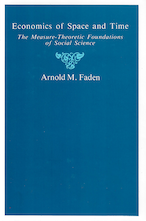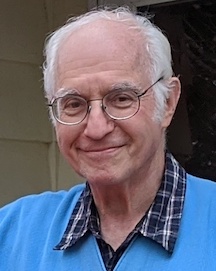
Parents' Photos PS11 Autograph Album

June 7, 2021 snapshot of yellow cards
Simplicial Geometry: A Barycentric Approach [PDF]
by Arnold Faden (2004)
LaTeX source [ZIP],
Uncorrected scan [PDF]
Are There Objective Values?: The Greatest Happiness Principle in Perspective [PDF] by Arnold Faden (April 2002)
The Influence of Economic Theory on Econometrics [PDF] by Arnold Faden (November 30, 1993)
Causality and Econometrics in FOCUS [PDF] by Arnold Faden (September 9, 1992)
Conditional Equilibrium Solution to a One-Dimensional Kalman Filter [PDF] by Arnold Faden (September 1992)
The Future of Economic Theory: The FOCUS Paradigm [PDF] by Arnold Faden (April 21, 1992)
The Theory of Comparative Advantage
for Many Countries and Many Industries [PDF] by Arnold Faden (1992)
Abstract: The theory of comparative advantage is extended to the case of many countries
and industries, building on the work of McKenzie and Jones. General conditions for
production patterns to be viable and efficient are found, and an enumeration of the
number of such patterns is obtained. The theory is then specialized to the case of
three industries (or three countries). Finally, there is an overview suggesting
connections with the theory of growth and innovations.
Keywords: Comparative Advantage, Ricardian Trade
Notes on Networks [PDF] by Arnold Faden (undated). For Econ 565, Location Theory. "I think that I shall never see, A network lovely as a tree..."
Natural Selection, Economics and Probability [PDF] by Arnold Faden (October 1987)
Handwritten manuscript [PDF]
The Existence of Regular Conditional Probabilities: Necessary and Sufficient Conditions by Arnold Faden (1985)
Annals of Probability, 13(1): 288-298 (February, 1985).
DOI: 10.1214/aop/1176993081
Citations
Related: YouTube:
Memories of David Blackwell and regular conditional probabilities
The Foundations of Probability [PDF] by Arnold Faden (1984)
In: Hauptmann H., Krelle W., Mosler K.C. (eds) Operations Research and Economic Theory. Springer, Berlin, Heidelberg.
DOI: 10.1007/978-3-642-69909-2_15
The Simplest Possible Adequate Monetary Policy Model [PDF] by Arnold Faden (1982)
Post-Bayesian Statistical Inference [PDF] by Arnold Faden (1981)
Notes on Micro Social Accounting and Multiperiod Budgeting [PDF] by Arnold Faden (October 1978). For Econ 601 Advanced Theory.
Progress reports for June 1977 - April 1978, September 1976 - April 1977 [PDF]
Econometric Policy Model Construction: The Post-Bayesian Approach by Arnold Faden and Gordon Rausser (1976)
Annals of Economic and Social Measurement, Volume 5, number 3: 349-363 (July, 1976)
Citations,
including Applied forecasting with an autoregressive
integrated moving average (ARIMA) model [PDF] (1977) by Gail Summers (nee Jensen)
Impeachment and the nuclear trigger [PDF] by Arnold Faden (December 5, 1973)
Are Utility Functions Bounded? [PDF] by Arnold Faden (May 14, 1973)
Inefficiency of the Regular Hexagon in Industrial Location
by Arnold Faden (1969)
Geographical Analysis, Volume 1, Issue 4: 321-328 (October 1969).
DOI: 10.1111/j.1538-4632.1969.tb00627.x
Citations
Industrial Location on the Euclidean Plane [PDF] by Arnold Faden (undated). "The major aim of this paper is to prove that the Christaller-Lösch solution is indeed optimal in a certain class of possible arrangements, viz, the class of uniform required deliveries, with plants arranged in a lattice, and each plant the exclusive supplier of its dirichiet region."
The Abstract Transportation
Problem [PDF] by Arnold Faden (May 24, 1969). Kansas-Missouri Conference on Theoretical
and Applied Economics, Ames, Iowa
Handwritten manuscript [PDF]
Economic Geography [PDF] by Arnold Faden (Summer 1962). The City College - Baruch School, Department of Economics. Description of a course taught by Arnold Faden. "The leading concept of the course will be that of the world as a system of regions and activities, linked in space, and evolving together in time."
A Theory of Consumption, Investment, and Saving [PDF] by Arnold Faden (April 26, 1962). Presented at Gary Becker's Labor Research Seminar.
Notes on a theory of population distribution [PDF] by Arnold Faden (December 7, 1961). Presented at Gary Becker's Labor Research Seminar.
Notes on a theory of population distribution [PDF] by Arnold Faden (undated). Baruch School C.C.N.Y
The Logic of Price and Productivity Index Numbers [PDF] by Arnold Faden (March 8, 1961). For the Labor Research Seminar with Prof. Jacob Mincer
Toward a Theory of Population Distribution [PDF] by Arnold Faden (December 3, 1959). Presented at Gary Becker's Labor Research Seminar.
Multiple Corporations [PDF] by Arnold C. Abramowitz, Arnold M, Faden, Donald L. Kuba (March 26, 1958). For Economics 362, Seminar in the Effects of Taxation on Business Policies and Practices
Retail Store Sales in New Jersey [PDF] by Arnold Faden (January 1957).
Lists affiliation as Economics Department, School of Business Administration, Rutgers University. Published in
"Review of New Jersey Business", Volume XII, Number 4.
"A recent report on retail store sales brings to light some
significant similarities and differences between the New
Jersey and the national patterns of retail trade. This article
will discuss comparative trends in retail store sales since
1929."
Trends in American Civilization: an outline [PDF] by Arnold Faden (1954). Published in "The City College, Business and Economic Review", Spring 1954, Number 2
The study of the spatial aspects of the economy has a long history, but only in relatively recent years has it begun to come into its own as a major field of study. Walter Isard's pair of treatises provide the latest comprehensive summaries of the state of the art. These two works offer an instructive contrast in point of view. The first is the latest in a traditional line of approach whose major emphasis is the development of theories giving insight into and understanding of spatial phenomena. The second -- as the title states -- concentrates on methods which can be applied to practical problems: data-processing frameworks and optimization techniques.
The present work belongs in the traditional line, in that the primary aim is insight rather than power. Though short, it is fairly comprehensive. We have tried to push back the frontiers all along the line, and in several directions: generalization of known results, tightening up of theories to modern standards of rigor, finding new interpretations for theories, and finding new theoretical representations for spatial phenomena. Major progress has been made in some directions, very little in others.
Chapters:

March 27, 2006
Iowa State Statistics Departmental Seminar
ABSTRACT: People realized soon after the publication of The Origin of Species (1859) that the principle of natural selection had applications far beyond its original scope, to competitive situations of all kinds: competition for wealth, power, office, beliefs among firms, nations, politicians, ideologies, theories, etc.
This suggests that it might be useful to identify the common core underlying these applications, stripping off the particular institutional trappings of each, and leaving the "pure" theory behind.
I take the key idea to be long-term differential growth rates. Prior to my paper of 1991, I take this subject to consist of just one theorem, by R. A. Fisher (1930, 1958), which may be stated as: the rate of change of mean fitness equals the variance of fitness. (For Fisher, "fitness" = growth rate). It turns out that this equation is just one of an infinite system of equations, and that the entire system is needed to answer some questions of interest such as: what distributions over growth rates perpetuate themselves (i.e., belong to the same location family at all different times)? Or, belong to the same scale family? Some results of relevance to "pure" probability theory will also be noted.
Afterwards I shall tentatively indicate how the theory may be modified and extended to make it more realistic by incorporating competition (which limits overall growth), variation, interaction and organization. And I shall try to assess the role of natural selection in a reasonable world view.
References:
September 11, 2005
Iowa State Math Club (Pi Mu Epsilon)
Starting from an article in 1930, Ramsey theory has blossomed into a significant and very pretty branch of combinatorial analysis. My talk will present its basic concepts, theorems, and proofs for both the finite and infinite forms of the subject. The treatment is entirely elementary, requiring (in principle) only an understanding of the meaning of "and", "or", and "set".
March 28, 2004
Iowa State Math Club (Pi Mu Epsilon)
Iowa State Philosophy Club
December 5, 2003
So there's something which is preventing these ideas, the usage of probability theory for handling uncertainty from going to fruition. And the opposing force, I believe, is complexity costs in general. So what we have here is a force making for people using probability theory, to handle uncertainty, versus complexity, complexity force.
Iowa State Philosophy Club
Spring 2002
"This is the presentation of a whole new philosophical system -- ethics, ontology, epistemology, politics, the works. Hence I cannot give too many details here, but just the overall vision, with some indications of the grounds for it and some consequences."
March 4, 2001
Iowa State Math Club (Pi Mu Epsilon)
March 19, 1997
Iowa State Economics Department
"This talk is really a combination of progress report and a kind of apology for the life I've been leading for the last couple of decades and it has elements of a farewell address to it since I'm officially retiring in May, although I hope to be around in an unofficial capacity for some time longer."
April 21, 1992
Iowa State Economics Department
May 15, 1991
Iowa State Economics Department
You can use this address both for questions about the site and also to send a message to Arnold Faden. This site is being run for him by his children while he works up to jumping more fully into the Internet age.
Last update: May 17, 2025. Log